Grassroots Advocacy Strategies in the State of Maine (ME LEND)
June 25, 2018

|
| LEND Trainees and Faculty pose with Senator Shenna Bellows (third from left) and Kim Humphrey (far right. |
The Maine LEND Program hosted an Advocacy and Strategy Forum on April 27, 2018, in Lewiston, Maine. LEND Trainee, Kim Humphrey, a public health advocate, founder of Community Connect ME, and mother of a child with autism, led the charge with key decision makers who work with and/or have children with Intellectual Developmental Disabilities (I/DD) in the state. State Senator Shenna Bellows and former Maine State Legislator Peter Stuckey led one key aspect of the Strategy Forum. Speakers and presenters also included University of Maine professor and Center for Community Inclusion and Disability Studies Director, Alan Cobo-Lewis; LEND trainee and occupational therapist, Taylor Cahill; LEND trainee and family member, Sanaa Abduljabbar; Coordinator of Education and Autism for the Center for Community Inclusion and Disability Studies, Alan Kurtz. There were approximately 40 leaders and advocates in attendance.
Topics included personal stories, challenges and opportunities for inclusion, and discussion about advocacy for individuals with ID/DD. Employment opportunities, transition to adulthood, positive change for those with no voice, improved early identification and early intervention, and independence opportunities among those with developmental disabilities were topics of concern and interest as well. "This forum was a huge success as it connected people who have similar concerns regarding friends or loved ones with a developmental disability and enabled them to brainstorm and talk through ways to provide better supports and services for their friends, family and children who may not be able to speak for themselves," stated Maine LEND self-advocate, Matt Pascarella.
Next steps include circulating contact information and data compiled from the forum and reconvening in the fall to determine interest in pursuing longer-term statewide advocacy strategies. Data from an Advocacy Action Topic checklist indicated that participants at the forum could organize into manageable sized teams of 6-8 advocates according to issues. A disability topic questionnaire for candidates running for office in the November 2018 election received high interest. Moving forward, the ultimate goal is to reach beyond forum participants and strengthen the state network of those advocating for better policies to support people and families with I/DD. Improving early intervention and inclusion, as well as reducing waitlists associated with poor reimbursement rates, were cited as high priorities.







